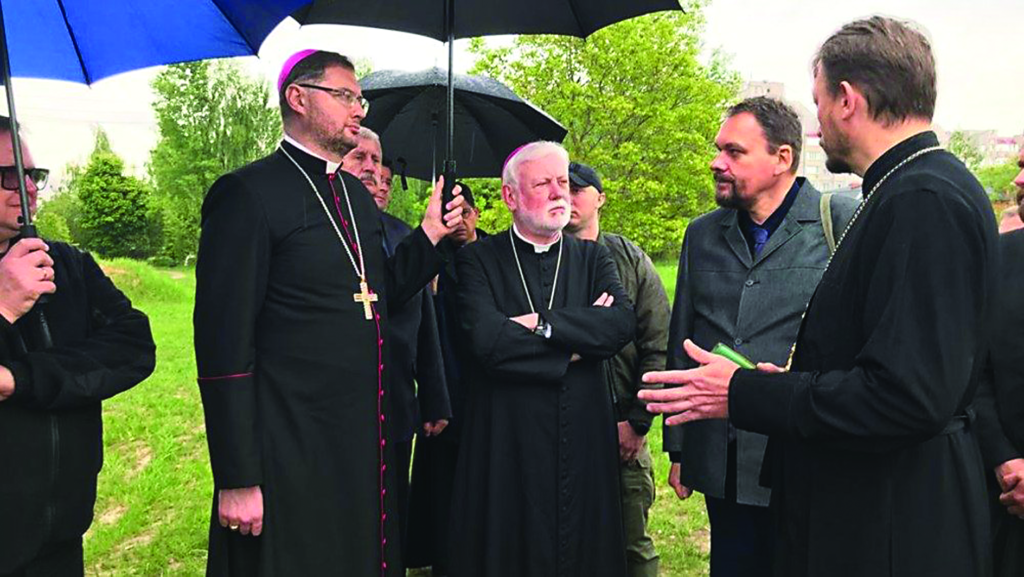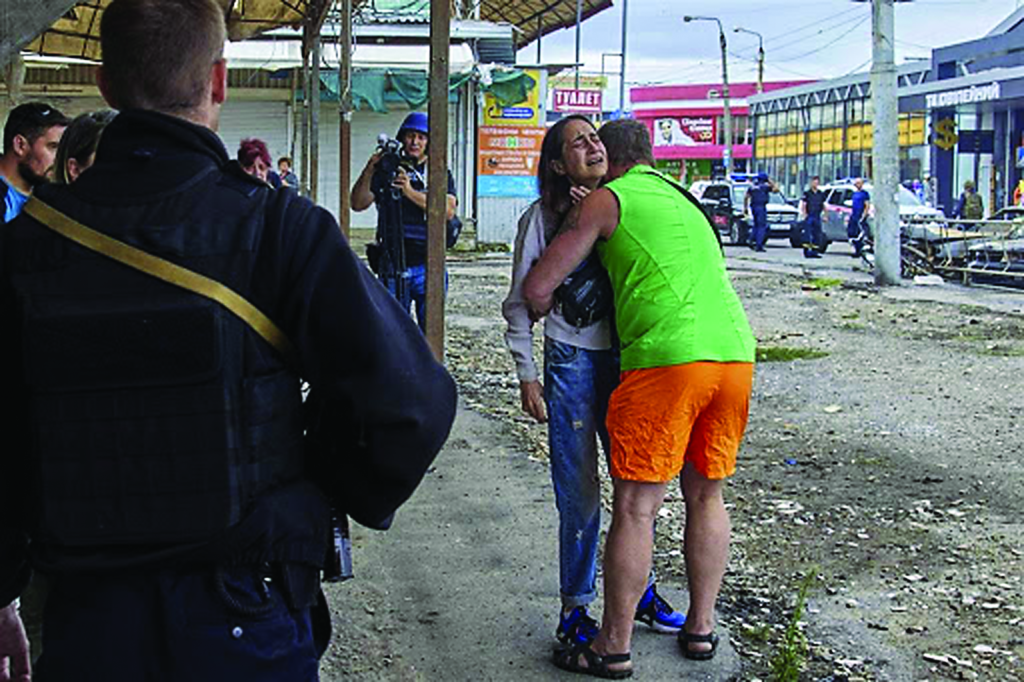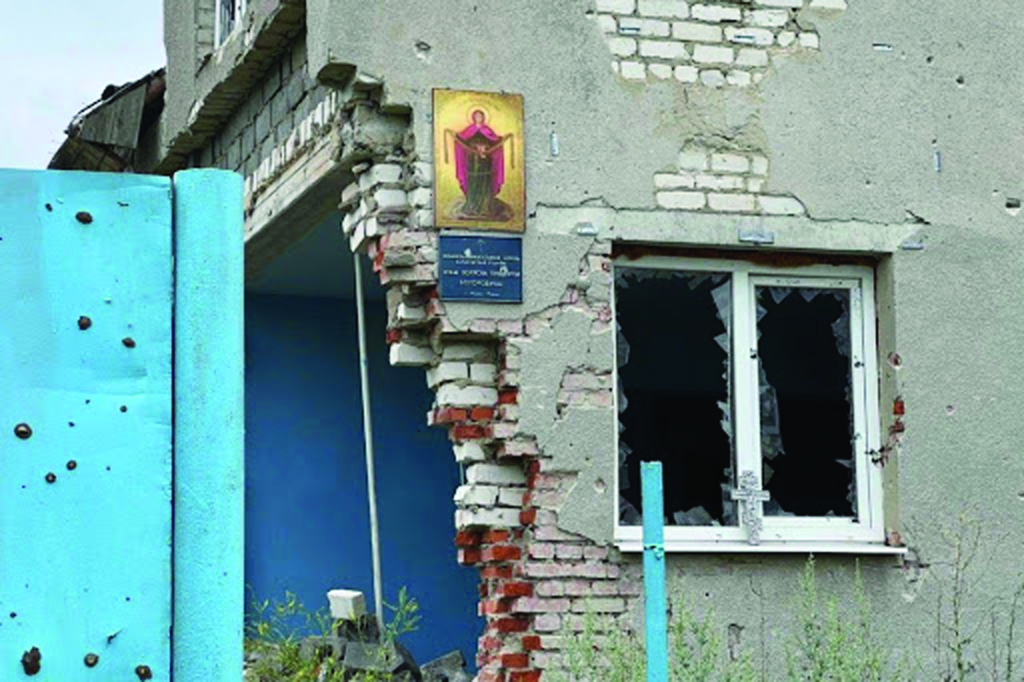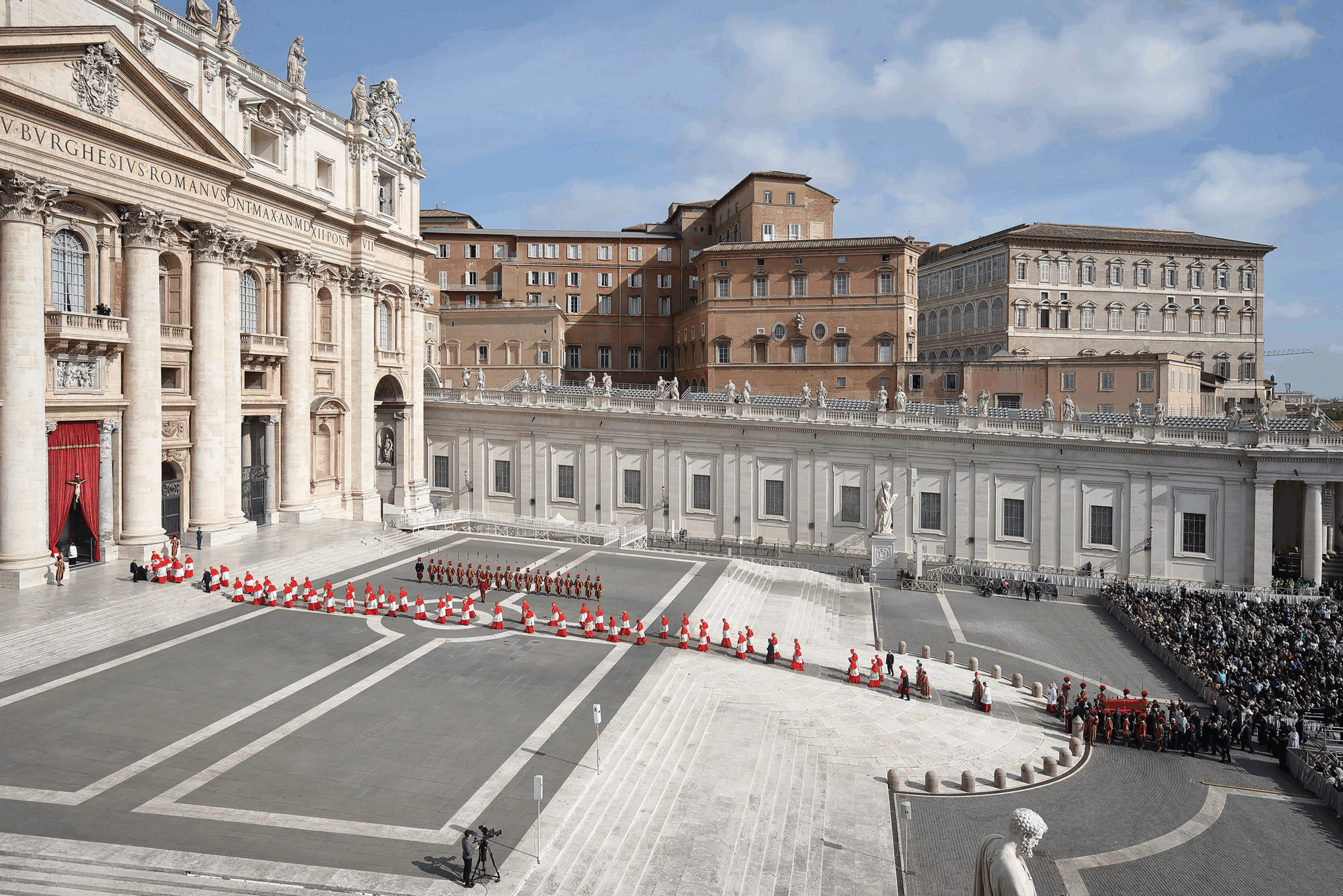“It is incumbent on the international community to keep the hope of negotiation alive”
By Gerald O’Connor (America)

In the center of the photo, Archbishop Paul Gallagher, accompanied by Monsignor Kulbokas, on the left, visits the scenes of the conflict in the area near Kiev
Archbishop Paul Gallagher, the Vatican’s Secretary for Relations with States since 2014, spoke recently with Gerald O’Connor of America magazine about the situation in Ukraine and the Pope’s role in a potential peace process. The following is an excerpt.
Gerald O’Connor: How do you read the situation today in Ukraine?
Archbishop Paul Gallagher: Obviously, the war continues. It’s to some extent what people describe as a war of attrition. But there’s a great loss of life. It’s difficult to see a solution on the horizon. I obviously hope and pray that a solution will come about and that it will come about through negotiation and diplomacy, to which certainly the Ukrainians are committed. But it’s very difficult for the Ukrainians to envisage real negotiations at this time because of the depth of the suffering and the trauma of the people. I’m afraid that it’s going to go on, with losses on both sides.
I think it is incumbent upon the international community to keep the hope of dialogue, the hope of negotiation alive. And I think that’s certainly part of the role of the Holy See at this time, without ignoring the violence and the conflict, at the same time saying, “Ultimately, we have to talk; ultimately, there has to be negotiation; ultimately, there has to be the restoration of peace.”
Has there been any approach from Moscow to the Vatican regarding mediation?
No, not formally. We maintain contacts with the embassy here to the Holy See. We maintain contacts, to some extent, with the government institutions through the apostolic nuncio in Moscow. But there has been no explicit invitation to the Holy See by Moscow to mediate.
Cardinal Pietro Parolin has said that at different times, including when the Pope visited the Russian Federation’s Embassy to the Holy See, the Vatican has made various requests to the Kremlin. Has there been any positive response from the Kremlin to any of these requests?
I think the response has been that the position of the Holy See is appreciated. The willingness of the Holy See is appreciated, but they haven’t gone that step further to saying, “Yes, let us talk about possible assistance, a possible mediation together with the Ukrainian side.”
And there has been no invitation to Moscow for the Pope?
No, not explicitly. Again, I think there have been some nice noises, some positive remarks, but nothing as explicit as an invitation.
When you were in Kyiv, you described Russia as “the aggressor” in Ukraine, and said the Holy See supports “the territorial integrity of Ukraine.” I take it you were speaking in the name of the Pope.
I was speaking in the name of the Holy See, and the Holy Father hasn’t corrected me so far on what I’ve said on his behalf. I should point out that when we talk about the Holy See supporting the sovereignty and territorial integrity of Ukraine, that is our position, and we believe that it corresponds to the position of the government. Now that’s a point of departure. It’s up to the Ukrainians to negotiate with others, with the Russians, obviously, in particular. Now, if they want to modify that territorial integrity, that is up to them. But as far as we are concerned, I understand that that is their position to this day, and we respect it.
It’s a principle that one applies across the board. For many decades, for example, we respected the sovereignty and the territorial integrity of the Baltic countries during the Soviet occupation. We never changed our position on that, and that was very much appreciated by those countries, particularly when they regained their independence after the fall of the Soviet Union.

After a Russian missile attack in a residential neighborhood in Kharkiv, Ukraine (Ansa)

A destroyed church in a village on the outskirts of Kharkiv in Ukraine (Gambassi)
So you wouldn’t recognize a unilateral declaration of independence of the Donetsk and Luhansk regions?
No, we wouldn’t recognize any such unilateral declaration of independence.
You said on Italian state television some days ago that Pope Francis could go to Kyiv in August? How realistic is that?
I don’t know. I’m not the Pope. I’m not the Pope’s doctor. And we’ve yet to make the visit to Canada. But I think the Pope is in good spirits. He undoubtedly has made great progress in his mobility. Maybe when we come back from Canada, and with the coming of August, it may be that he will want to start looking at that seriously and making some plans.
But from what you know, he’s determined to go?
Oh yes, he wants to; he wants to and he feels he should go to Ukraine.
Despite the lack of an invitation from Moscow?
I would say so! The two things are not linked. It might be a good thing if they were linked. But I think the Pope’s main priority at this moment is to make the visit to Ukraine, meet with the Ukrainian authorities, meet with the Ukrainian people and with the Ukrainian Catholic Church.






Facebook Comments